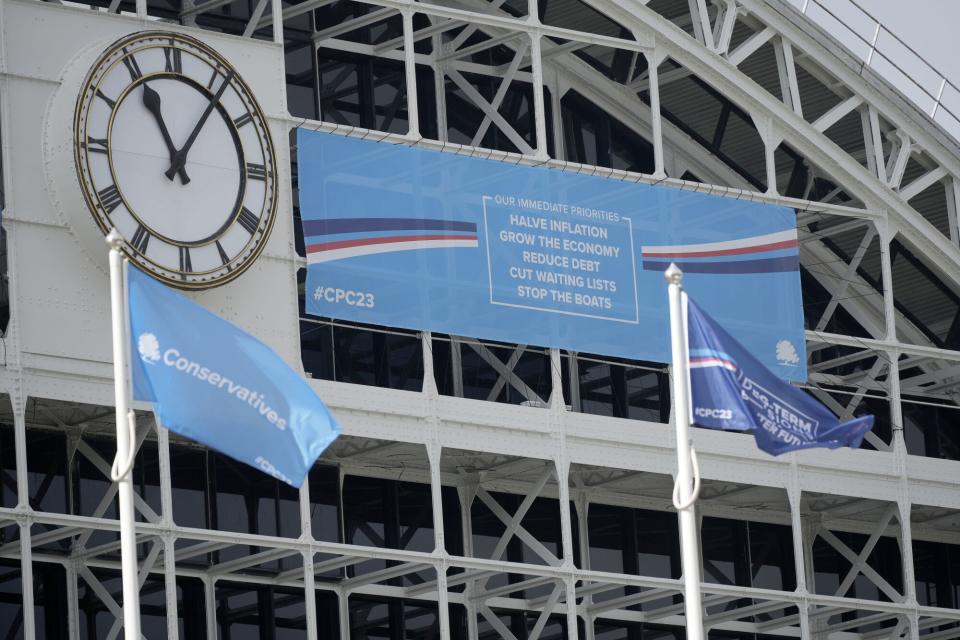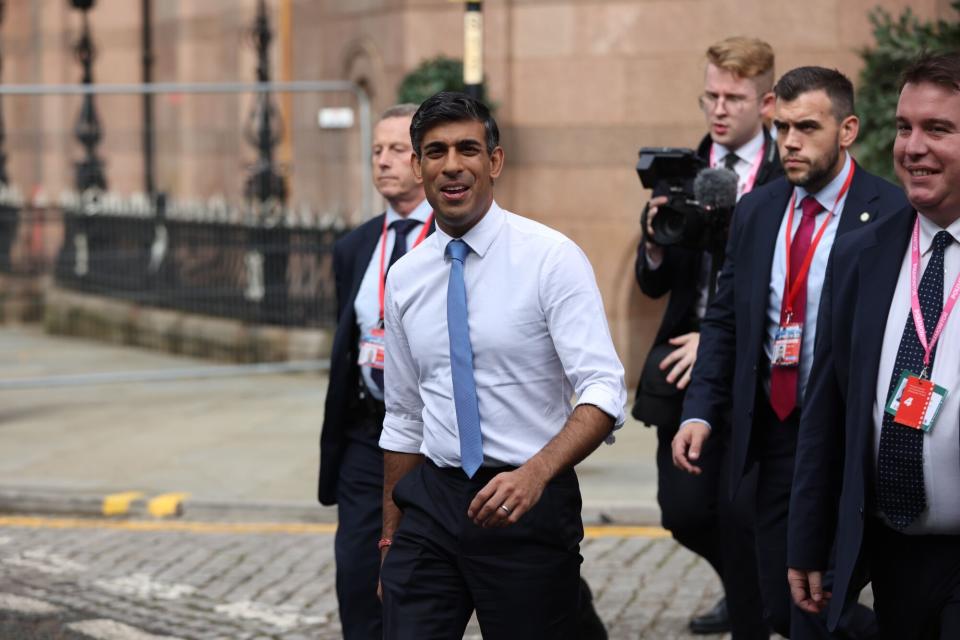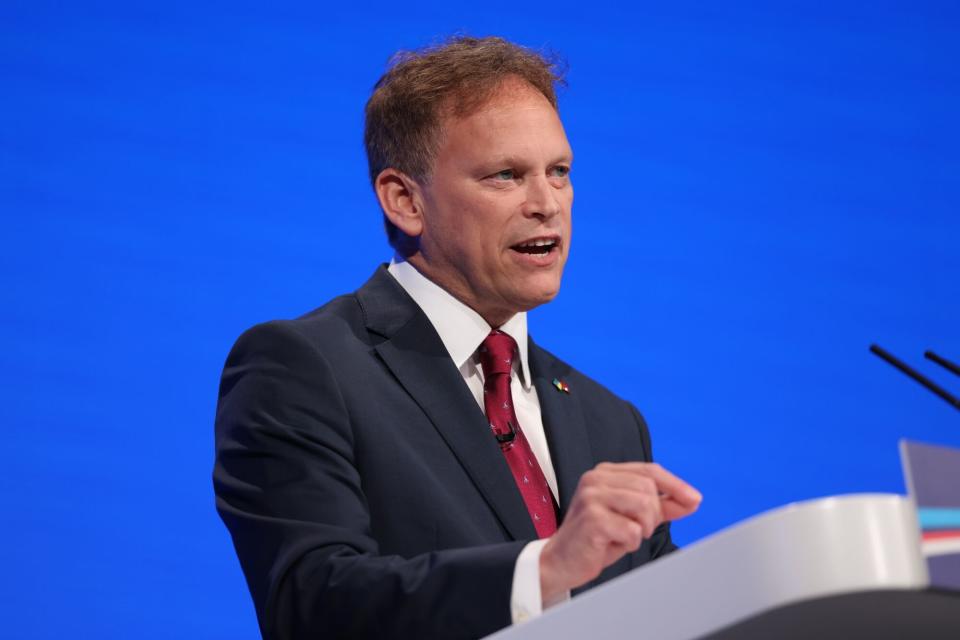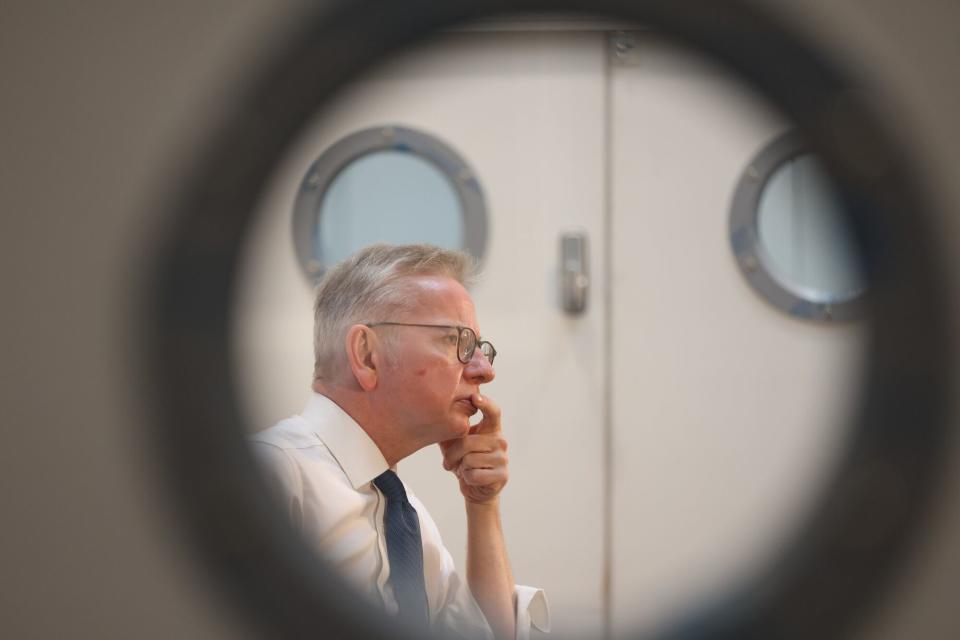Leadership Jostling, Tax Row Put Pressure on Sunak: Tory Latest
- Oops!Something went wrong.Please try again later.
- Oops!Something went wrong.Please try again later.
- Oops!Something went wrong.Please try again later.
- Oops!Something went wrong.Please try again later.
- Oops!Something went wrong.Please try again later.
(Bloomberg) -- Prime Minister Rishi Sunak’s efforts to use the Conservative Party conference to unite his party ahead of a general election next year suffered an early setback when senior Tories called for immediate tax cuts.
Most Read from Bloomberg
Airbnb Is Fundamentally Broken, Its CEO Says. He Plans to Fix It.
Severe Crash Is Coming for US Office Properties, Survey Says
JPMorgan’s Dimon Predicts 3.5-Day Work Week for Next Generation Thanks to AI
The Secret Plot Against the Head of the World Health Organization
It put the premier on the back foot before the event was properly under way, and during a tetchy interview with the BBC Sunak also refused again to commit to building the UK’s flagship HS2 rail line to Manchester. That makes an awkward backdrop to the conference, where speculation about who will run to replace Sunak if he loses the election is already gathering momentum.
Sunak also faces pressure to withdraw from the European Convention on Human Rights as his government tries to stop asylum seekers arriving from France. On Monday, the focus shifts firmly to the economy. Chancellor of the Exchequer Jeremy Hunt will pledge to raise wages for the UK’s lowest-paid workers, while making it harder to claim benefits.
Read More: The Tories Auditioning for Sunak’s Job If He Can’t Save His Own
Key Developments, Stories:
Senior Tories including Truss, Patel say taxes should come down
Cleverly said UK would work with a Trump White House
Badenoch to say Sunak ‘brave’ on net zero retreat
Sunak and Harper dodge questions on completing HS2
BAE Systems Wins £4 Billion UK Contract for Nuclear Submarines
Unions Protest Against Tory Conference With a Week of Strikes
UK Considers Copy of Canada’s Growth Fund to Boost Investment
Sunak Faces Cabinet Split on Taking UK Out of Human Rights Pact
(All times UK)
Hunt Vows to Raise National Living Wage (10:30 p.m.)
Chancellor of the Exchequer Jeremy Hunt will pledge to raise wages for the UK’s lowest-paid workers in his speech to the conference on Monday.
The UK will increase the national living wage to at least £11 ($13.42) an hour from £10.42, Hunt is due to say on Monday at the Conservative Party conference, according to an e-mailed statement. That will increase annual earnings for full-time workers by at least £1,000.
At the same time, the government will clamp down on welfare claims with a review of the sanctions regime, to incentivize more people to return to work. “Those who won’t even look for work do not deserve the same benefits as people trying hard to do the right thing,” the chancellor is due to say.
Badenoch: Sunak ‘Brave’ to Retreat on Net Zero (10:30 p.m.)
Business Secretary Kemi Badenoch will call Rishi Sunak “brave” for “shattering a lazy consensus about the costs of net zero” after the prime minister last month pushed back deadlines for ending the sale of petrol-fueled vehicles and eased the push to replace gas boilers in homes.
Badenoch, hotly tipped to put herself forward for the Party leadership a second time if Sunak loses the next election, will hail Sunak’s ability to not “dance to the tune of the metropolitan bubble on energy policy” in her speech to the conference on Monday.
She will also dismiss economic models that demonstrate the negative impact Brexit has had on the economy. ”I’m here to set the record straight,” she will say. “They tell you Brexit is costing Britain 4% of GDP per year. WRONG.” The 4% figure stems from analysis by the government’s own fiscal adviser, the Office for Budget Responsibility.
Cleverly: China Engagement Not Just ‘Nice Chit Chat’ (8 p.m.)
Foreign Secretary James Cleverly said the UK government is right to engage with China, despite critics in the Conservative Party calling for ministers to take a tougher line with Beijing.
“The bottom line is China is large, it is wealthy, it is influential, it behaves on the international stage in ways that we feel need to change, which means that we have to engage with China,” Cleverly said. “Sometimes that makes it sound as if, as if this was a kind of a cosy cup of tea, and a nice chit chat over dim sum or slice of cake. That’s not what international relations is about.”
Read More: Hunt Says UK Need to Talk to China Trumps Espionage Dispute
UK Would Work With Trump, Cleverly Says (6:25 p.m.)
Foreign Secretary James Cleverly said the UK would always work with the US even if Donald Trump becomes president and scales back support for Ukraine.
“We respect the decision made by the voters of that country and, whoever they choose to be the next president, we will make sure that relationship works because when the UK and the US are working together, the world is a healthier, wealthier, safer place,” Cleverly said during an event at the conference. “We’ve seen him work for years. And so his unpredictability is predictable.”
Cleverly also said the UK should not leave the European Convention on Human Rights, after Business Secretary Kemi Badenoch and Levelling Up Secretary Michael Gove suggested doing so should be on the table (see 11:40 a.m.). “I don’t feel that in order to achieve what we need to achieve, to protect our borders, we are necessitated to leave the ECHR,” he said.
Transport Secretary Ducks Questions on HS2 (6:10 p.m.)
Transport Secretary Mark Harper spent Saturday morning on national radio declining to comment on reports that the government could axe the northern leg of its flagship high-speed rail HS2 project from Birmingham to Manchester.
He did the same again in his first words on the subject at the Conservative conference Tories’ conference in Manchester itself, dismissing the reports as “speculation.” While HS2 “plays a role” in levelling up northern regions, connectivity between cities across the north is also important, he said. Harper also declined to comment on whether rail would be included in the upcoming King’s Speech which sets out the government’s legislative program.
Darren Caplan, chief executive of the Railway Industry Association lobby group, warned at the event that the industry needed certainty from the government and would assume HS2 was going ahead unless told otherwise.
Gove Says UK Should Consider Leaving ECHR (6 p.m.)
Levelling Up Secretary Michael Gove became the third Cabinet minister (see 11:40 a.m.) in a week to say the UK should consider leaving the European Convention on Human Rights.
Britain should “keep every option open,” Gove said when asked by Bloomberg if he agreed with Business Secretary Kemi Badenoch that the government should consider leaving the ECHR. Gove backed Badenoch for the party leadership last year.
But in a sign of the gulf among Rishi Sunak’s top team on the issue, Security Minister Tom Tugendhat asked: “What is the alternative for the Good Friday Agreement?” The ECHR is written into the treaty that ended decades of sectarian violence in Northern Ireland in 1998.
Tories Bet Journalists They’ll Win Election (5 p.m.)
To take the Conservative Party’s temperature on day one in Manchester, journalists keep asking Cabinet ministers to put their money where their mouths are and bet on a Tory election win.
Levelling Up Secretary Michael Gove agreed a £100 ($122) wager with a Sun newspaper journalist that the Tories will upset Labour - which has a double-digit lead in opinion polls - in the UK vote expected next year. Culture Secretary Lucy Frazer agreed the same with the Independent. Foreign Secretary James Cleverly told LBC he “would” match it - though didn’t shake on it.
But asked by Times Radio if he’d take the bet, Tees Valley Mayor Ben Houchen replied: “Not at the moment.” Houchen is a prominent Tory figure in northern England, effectively a figurehead for the party’s recent inroads in areas that traditionally voted Labour — and which Sunak needs to hold.
Tory Centrists Are Also Looking at Leadership (4 p.m.)
The jostling on the right wing of the Conservatives (see 11:40 a.m.) to succeed Rishi Sunak if the party loses the general election next year has prompted some more moderate members of the Cabinet to consider running themselves. Allies of Science Secretary Michelle Donelan suggested she is one to watch in Manchester this week and may make her intentions more clear.
Donelan, who oversaw the UK’s return to the European Union’s Horizon information-sharing program and will be a key player in Sunak’s Artificial Intelligence summit next month, is a keynote speaker on Tuesday.
UK Signs Submarine Contracts Worth £4 Billion (3:20 p.m.)
The UK has signed contracts worth £3.95 billion pounds ($4.82 billion) to “drive forward the development the most powerful attack submarines ever operated by the Royal Navy,” Secretary of Defence Grant Shapps told the Conservatives’ annual conference.
Read More: BAE Systems Wins £4 Billion UK Contract for Nuclear Submarines
“These Hunter-Killer Orca submarines supplements will empower the Royal Navy to maintain our strategic advantage under the sea to compete with emerging navies anywhere in the world as our world becomes more prominent and dangerous,” he said.
Shapps was appealing to a party which frequently prioritizes defense spending higher than the voting public does. He also announced two new deployments of Royal Air Force Typhoon combat aircraft to Poland to support the NATO ally following Russia’s invasion of Ukraine, and authorized the deployment of a reserve battalion to NATO’s possible peacekeeping mission in Kosovo.
Senior Tories Take Aim at Labour’s Starmer (2:40 p.m.)
It’s Conservative Party conference and it’s typical for keynote speakers to target the opposition Labour Party. But even in that context, the opening speeches on Sunday have been notable for how much of the focus has been on Keir Starmer, whose party has a double-digit lead in the polls.
Chairman Greg Hands accused Starmer of changing his mind “60 times in just three years” and pointed delegates to Starmer flip flops on sale at the Tory conference shop. Northern Ireland Secretary Chris Heaton-Harris said Starmer, a Remainer, has changed his stance on Brexit.
Starmer has acknowledged recalibrating his positions as the government’s fiscal position deteriorated in recent years, and will have his chance to hit back at his Labour Party’s own conference in Liverpool in a week’s time. He may well point out that Prime Minister Rishi Sunak also has form on changing his mind, including watered down the government’s green agenda and refusing to commit to completing the UK’s high-speed HS2 rail link.
Pressure Builds on Sunak Over ECHR (11:40 a.m.)
In her US speech (see 11:20 a.m.), Home Secretary Suella Braverman also called for the reform of international treaties including the United Nations’ Refugee Convention and the European Convention on Human Rights, as she tries to reduce asylum claims in the UK.
Braverman has long been an advocate of withdrawing from the ECHR unless it changes, after the Strasbourg court that oversees it blocked the UK from beginning deportation flights to Rwanda. That policy is also being challenged in the UK Supreme Court, and if the ruling doesn’t go the government’s way, Tory pressure to withdraw from the convention will be immense.
In an interview with the Sunday Times, Business Secretary Kemi Badenoch — who like Braverman is on the right of the party — said leaving the ECHR is “definitely something that needs to be on the table.” The problem for Sunak is that doing so would likely damage the UK’s international reputation. An immediate issue is that the ECHR is written into the Good Friday Agreement that ended decades of sectarian violence in Northern Ireland in 1998.
Patel Accuses Braverman of ‘Attention’ Seeking (11:20 a.m.)
In a sign that it’s not only on tax where Tory tensions are running high, former Home Secretary Priti Patel hit out at Suella Braverman’s current performance in the job, saying that her speech last week in the US was “to get attention.”
“Speeches are not substitute for delivery,” Patel told Sky News on Sunday. The intervention comes as the government struggles to deliver on Rishi Sunak’s pledge to stop asylum seekers from arriving in boats from France.
In the speech last week, Braverman said being gay or a woman should not entitle people to asylum, later adding that some people “purport” to be gay to “game the system.” She also said multiculturalism in the UK has failed. The speech angered colleagues in the party, who saw it as an unsubtle pitch to grassroots Tories ahead of a future leadership bid.
Sunak Rejects Suggestion He Lacks Mandate (10:45 a.m.)
Rishi Sunak’s new slogan for the Conservative Party, “Long-Term Decisions for a Brighter Future,” has opened the prime minister up to accusations that he doesn’t have an electoral mandate to — as the prime minister himself put it — change the trajectory of the UK. Critics point to his watering down of the UK’s green agenda and wavering on the HS2 project as evidence he’s moving away from the 2019 manifesto on which the Tories were elected.
“I have a good sense about what the British people’s priorities are,” Sunak told the BBC when asked directly who voted for his agenda. “I’m doing what I believe is right for the long term of our country. I am prepared to change things and I’m going to do things differently.”
The issue is unlikely to go away, especially if he rolls out more policies immediately rather than including them in the next manifesto for the Tories to campaign on. Sunak was the choice of Tory MPs following Liz Truss’s chaotic 49-day administration last year. But he was earlier rejected by fee-paying members of the Conservative Party, who opted for Truss, and the last time British voters had their say was when Boris Johnson was prime minister.
Sunak Again Refuses to Comment on HS2 (9:55 a.m.)
Rishi Sunak’s government has spent days fending off questions about the future of the HS2 high-speed rail link, in particular reports ministers are considering scrapping the northern leg between Birmingham and Manchester. On Sunday, the premier again refused to say if it will go ahead.
“I’m not going to comment on further speculation, but what I can tell you we are doing is absolutely committed to levelling up across this country,” he told the BBC. He also said connections between northern cities and transport within them should be prioritized, another hint that a change to HS2 may be coming.
Questions about HS2 have emerged as Sunak has begun talking about adopting a more pro-motorist agenda, which Transport Secretary Mark Harper is expected to announce in his keynote speech on Monday.
Read More: Sunak Says Filling UK Potholes as Pressing as Pricey HS2 Project
Hunt: Tories Need ‘Credible Answer’ on Tax (9:50 a.m.)
Chancellor of the Exchequer Jeremy Hunt has repeatedly rejected calls from his fellow Conservative MPs for immediate tax cuts, saying the government needs to focus on reducing inflation and boosting growth. Still, in an interview with the Times newspaper on Saturday, he acknowledged that a party that hoped to win the next election would need a “credible answer” to the question of whether taxes would rise forever.
Sunak Says He’s Focused on Inflation (9:30 a.m.)
Prime Minister Rishi Sunak, responding to a call from one of his own Cabinet ministers to cut taxes before the general election (see 8:35 a.m.), said he is focused on reducing UK inflation.
“I’m a Conservative, of course I want to cut taxes. The best tax cuts that I can deliver to the British people right now is to halve inflation,” Sunak told the BBC on Sunday. “It’s a tax that impacts the poorest people the most.”
But his refusal to commit to cutting taxes before the vote is likely to worry many members of his party, and heap more pressure on his Chancellor of the Exchequer Jeremy Hunt ahead of his fiscal statement in the autumn.
Gove Backs Tax Cuts on ‘Work’ (8:35 a.m.)
Veteran Cabinet member and Brexit campaigner Michael Gove added his voice to the chorus of Conservatives calling for tax cuts before the next election. But he said he favored tax cuts on “work,” rather than on inheritance, as been under discussion in Downing Street.
“My own view is that wherever possible, we should cut taxes on work,” Gove, who oversees the government’s efforts to “level up” less prosperous areas, told Sky News. “In other words, we should incentivize people to work harder. We should make sure that they’re better rewarded for the enterprise, the effort, the endeavor that they put in.”
Pressed for specifics, Gove said it was up to the chancellor and the premier to decide tax policy. While he didn’t echo calls of some MPs for immediate relief, he said he “would like to see the tax burden reduced before the next election.”
(An earlier version of this story corrected comment from Cleverly to show he does not think UK should leave ECHR)
Most Read from Bloomberg Businessweek
With Banks Offering 5% Returns, Financial Advisers Fight Irrelevance
Got Plastic With a No. 2 Recycling Symbol? Beware a Toxic Problem
Feeding the World Once Brought the US Untold Influence—No More
©2023 Bloomberg L.P.







